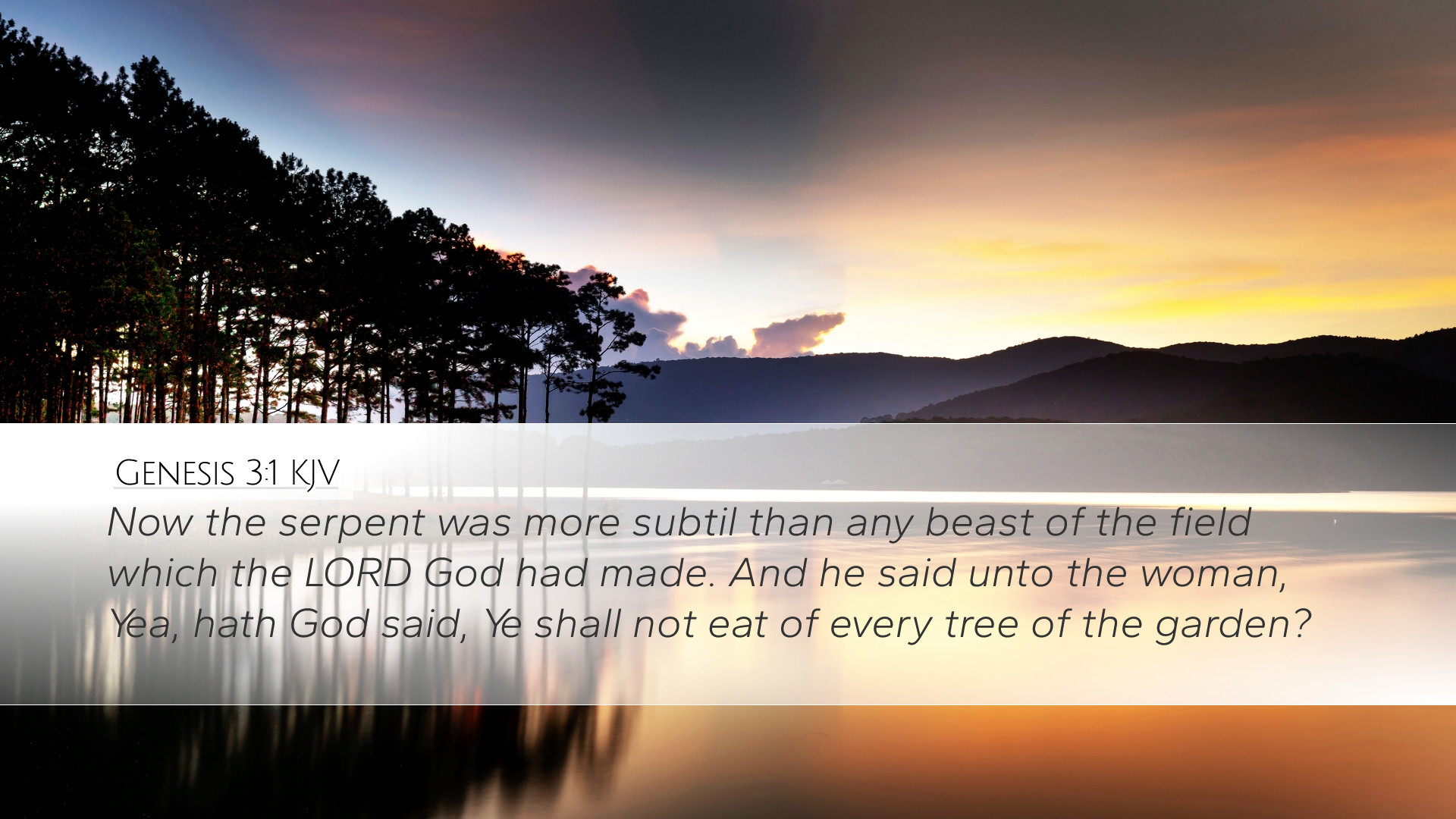Commentary on Genesis 3:1
Verse: "Now the serpent was more cunning than any beast of the field which the LORD God had made. And he said to the woman, 'Has God indeed said, "You shall not eat of every tree of the garden"?'”
Introduction
This verse marks a pivotal moment in the narrative of creation and the fall of man. The appearance of the serpent introduces a significant antagonist in the story, one whose cunning nature suggests complexity and deception. Commentators like Matthew Henry and Albert Barnes offer insights that highlight the implications of this encounter for humanity and theology.
The Nature of the Serpent
Matthew Henry emphasizes the serpent's cunning, asserting that this attribute points to its deceptive intentions. The serpent, as a creature made by God, reflects the potential for evil present in creation, dominating the narrative of sin and redemption. Henry states:
"This creature was more subtle than any beast of the field; it approached Eve with a semblance of wisdom that entwined intrigue with deception."
Similarly, Albert Barnes notes that the serpent's cunning presentation parallels the sin that later interlaces with human disobedience. The serpent employs subtlety as a tool of temptation:
"Cunning involves an artful practice to ensnare the unguarded heart, leading one away from divine truth."
The Question of God’s Command
The serpent's inquiry to Eve, "Has God indeed said...?" introduces a strategy of doubt against divine instruction. Adam Clarke points out that this questioning technique serves as a fundamental tactic of temptation, designed to undermine confidence in God's word:
"The serpent's question is a direct assault on the integrity of God's commands, creating an opening for doubt to permeate Eve’s understanding."
This strategy reflects a broader theme of temptation, inviting believers to reconsider the clarity and reliability of God's commands.
- Subtlety of Temptation: The serpent’s approach suggests that temptation often comes not as a direct confrontation but as a form of inquiry that leads to doubt.
- Importance of Divine Instruction: By questioning God's word, the serpent attempts to shift Eve’s perspective away from obedience, emphasizing the centrality of Scripture in resisting temptation.
Implications of Disobedience
The dialogue initiated here culminates in disobedience and the tragic fall. Henry comments on the progression of thought that the serpent invokes:
"Wherever doubt is sown, the seeds of disobedience grow. The inquiry leads towards a false conclusion about God's intentions."
Barnes expands on this, illustrating how questioning God's goodness and the boundaries established by His commands creates a pathway to sin:
"Eve’s interaction with the serpent signifies a moment where trust in God's benevolence is breached, laying the foundation for her eventual fall."
Theological Reflections
This passage invites significant theological reflections on human nature, sin, and redemption. The serpent symbolizes not only the adversary of humanity but also the complexities of temptation and spiritual warfare.
- The Nature of Sin: The serpent's cunning illustrates how sin often masquerades as something desirable, leading individuals to rationalize their disobedience.
- The Authority of Scripture: Emphasizing the necessity of relying on God's word equips believers to counter temptation and affirm divine truth in their lives.
- The Consequences of Doubt: The fall of humanity begins with a simple question, underscoring the importance of faithfulness to God's commands.
Pastoral Application
For pastors and theologians, Genesis 3:1 serves as a profound lesson on the nature of temptation in the lives of congregants. Recognizing the tactics used by the serpent can guide pastoral counseling and support:
- Teaching on Temptation: Educating church members about the nature of temptation helps to foster discernment and resilience in the face of spiritual challenges.
- Encouragement of Scripture Study: Promoting regular engagement with Scripture can fortify believers against the deceptions of the enemy.
- Creating an Environment of Openness: Encouraging discussions about doubt and faith can alleviate the shame associated with questioning, allowing opportunities for deeper faith development.
Conclusion
Genesis 3:1 serves as both a warning and a lesson. The cunning of the serpent represents the subtleties of sin that continue to infiltrate believers’ lives today. By reflecting on this verse, pastors, theologians, and students of scripture can gain insight into the timeless struggle between faith and doubt, obedience and disobedience. The implications of this verse echo through the narrative of scripture, reminding believers of the importance of remaining rooted in God’s commands amidst the deceptive inquiries of the world.


